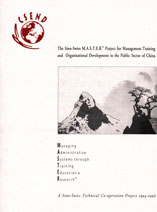 Click to ViewFull Booklet
Click to ViewFull Booklet Leadership Selection and Development in the Public Sector for the 21st Century: Case Example of China
Leadership Selection and Development in the Public Sector for the 21st Century: Case Example of ChinaChapter in "Action Learning Worldwide" Edited by Yury Boshyk, Palgrave 2002: Building internal capacities for change: Two case examples of Action Learning in the Public and Private Sectors in China
 Abstract
Abstract
Institution Development Programme
CSEND's task was to design and carry out a long-term institution development process comprising an Action Learning-based Training-of-Trainers (TOT) programme for national, provincial and enterprise-based training institutions. This programme focused on organisational consulting and human resource management. Trainees were either personnel management officials or training managers, generally between 30 and 40 years of age.
The TOT programme was implemented in two successive two-year cycles between 1994 and 1996. Each cycle, attended by approximately 30 trainees, consisted of training seminars, project work and an overseas study programme. The project work was designed to initiate the institutional development process within the participating institutions through the review of current training programmes, an in-depth needs analysis, and the design of training programmes and materials to address perceived needs.
The training seminars covered topics from the following five areas:
1. Training management (adult learning and training methodology)
2. General management principles and practices
3. Human resource management
4. Organisational behaviour and development
5. Public management.
6. During the overseas study programme, the Chinese trainees visited both government administrative organisations and public and private companies in Switzerland, Italy, Germany and Austria. They studied different models of country and organisational development, and compared a variety of approaches to organisational change, human resource management and management training.
In a complementary "Executive Programme", 25 senior Chinese personnel officials representing the supervising bodies of the trainees' respective institutions, attended an intensive one-month study programme comprising training seminars in Beijing and an overseas visit to Switzerland and Germany.
The Executive Programme had two main objectives: first, to raise the participants' awareness of current issues in public administration and human resource management; second, to familiarise the participants with the Sino-Swiss cooperation project and thus ensure their support for the optimum utilisation of the trainees' newly-gained knowledge and skills. It was the first project of its kind in Switzerland involving senior Chinese personnel officials.
Results
- The bilateral project produced many significant results, including:
- Development of a training network across provincial boundaries which shared common experiences in conducting competence-based training programmes;
- development of the professional skills of participating Chinese trainers, training managers and personnel managers in the areas of organisational consulting and management development;
- Development of alternative training programmes and training materials in Chinese institutions;
- Initiation of the revamping of existing management training curricula and training approaches at the participants' training institutions.
- Through this project, CSEND also initiated the certification process for management development specialists and the implementation of ISO training standards in China.
Publications:
Yiu, L., Saner, R.; "Public Management Training in China: The Challenges Ahead". Centre for Socio-Eco-Nomic Development, Working Paper. 1994.
Saner, R., Yiu, L.; "Public Management Training in China: A Sino-Swiss Partnership 1986-1996". Paper VI17. 3rd International Conference of IIAS Brussels on "New Challenges for Public Administration in the Twenty-First Century", Beijing, 1996.
Yiu, L., Saner, R.; "Use of Action Learning as a Vehicle for Capacity Building in China", Performance Improvement Quarterly, Special Issue, vol. 11(1), 1998.
Yiu, L., Saner, R.; "Lessons Learnt from Implementing A Large System Development Project in China", presentation made at 1998 International Congress of Applied Psychology, San Francisco. CSEND Working Paper, 1998.
 Link
Link
 Administrative Reform through Training: Background The rapid growth of China's economy over the past decade has put increasing performance pressure both on its public administration and on government officials, who have been compelled to acquire new skills in order to meet the complex challenges of the "four modernisations". This pressure further increased after 1993, when more than a fourth of all civil service jobs were eliminated.
Administrative Reform through Training: Background The rapid growth of China's economy over the past decade has put increasing performance pressure both on its public administration and on government officials, who have been compelled to acquire new skills in order to meet the complex challenges of the "four modernisations". This pressure further increased after 1993, when more than a fourth of all civil service jobs were eliminated.